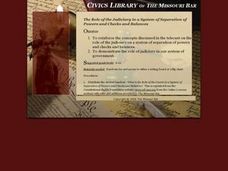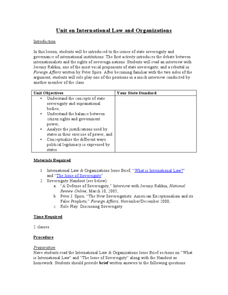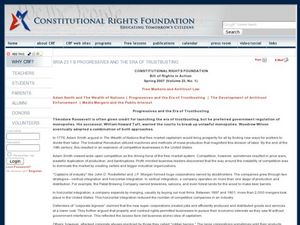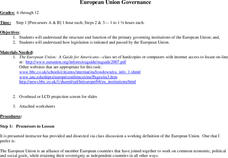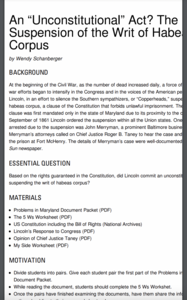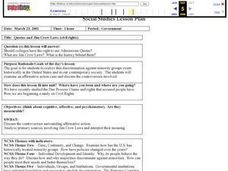School Improvement in Maryland
Affirmative Action
Do the government's affirmative action policies promote equity in the United States? The Fourteenth Amendment to the US Constitution and affirmative action policies come under scrutiny in an activity that asks class members to...
Curated OER
The Government and Natural Rights
Students are introduced to some basic ideas the Framers used in creating the kind of government they thought would best protect the natural rights of each individual and promote the good of all. At the conclusion of the lesson, they know...
Curated OER
Government: Missouri Bar Civics Library
Students visit the Missouri bar Website to examine information about the U.S. Constitution and its Amendments. They complete a variety of activities from the provided lessons including the judiciary, Fourth Amendment issues, civil law,...
Curated OER
Unit on International Law and Organizations
Pupils participate in a debate between internationalists and the rights of sovereign nations. They read interviews and role play one of the sides in a mock interview.
Curated OER
The Development of Antitrust Enforcement
Pupils analyze antitrust enforcement. In this American economics lesson, students listen to their instructor present a lecture regarding the details of the free market system and antitrust laws. Pupils respond to discussion questions...
Curated OER
Progressives and the Era of Trustbusting
Students investigate the free-market system and anti-trust laws. In this Bill of Rights lesson, students listen to their instructor present a lecture on the details of monopolies and the progressive reform movement to establish...
Curated OER
European Union Governance
Students explore the government functions of the European Union and how legislation is passed. As a class, students define the European Union and their interests in economic, political and social issues. Using the internet, students...
Curated OER
Twelve Angry Men: Trial by Jury as a Right and as a Political Institution
Young scholars explore the constitutional guarantee of the right to trial by jury. In this U. S. Constitution lesson, students read or view Twelve Angry Men and respond to discussion questions regarding the jury. Young scholars examine...
Curated OER
National Service: Lesson Plan
Students explore and take postions on the concept of mandatory community service. They then debate the issue in class as a learning model.
Curated OER
Recycling Lesson Plan
Students examine the role of choice in a democracy, the choice to participate and not to participate. They take a position on the role of recycling and whether in a democracy people can be forced to recycle. They break into for and...
Curated OER
Daniel Shays and the Constitution
Students contrast the diverse views of Connecticut River Valley people in the years before, during, and after the Revolution.
Curated OER
An "Unconstitutional" Act? The Suspension of the Writ of Habeas Corpus
Students explore the implications of habeas corpus. In this Civil War lesson, students analyze the writ of habeas corpus by Lincoln during the war. Students examine primary sources from Lincoln and Chief Justice Taney. Students design...
Curated OER
California's First Constitution
Students read excerpts from speeches made at the California Constitutional Convention. They predict what the state constitution say about slavery and other issues concerning race.
Curated OER
Classifying Rights From Various Constitutions
Students examine classification categories of rights: liberty, security, cultural and group rights using worksheets. They analyze the constitutions of five countries of the Pacific Rim while looking at the rights that are included in them.
Curated OER
The Constitution: Written or Unwritten?
Students form teams and debate whether the Canadian Constitution has evolved to be primarily written or unwritten.
Curated OER
Lesson 2: How Taxes Evolve
Twelfth graders examine the legislative process of enacting federal income tax laws. They conduct research and report on the Federal Migratory Waterfowl Stamp (Duck Stamp) Act of 1934.
Curated OER
The Written and Unwritten Constitution
students examine the written and unwritten nature of Canada's Constitution, and argue which (if either) has a greater influence in Canada's governance.
Curated OER
Quotas and Jim Crow Laws
Students examine the use of quotas and Jim Crow laws. They discuss discrimination against minority groups both historically and in contemporary society. Students examine an affirmative action case and discuss the controversies involved.
Curated OER
Ohio's U.S. Presidents
Fourth graders investigate the state of Ohio's claim to be the "Mother of Presidents." Nine U.S. presidents were from the state and their contributions and terms of office are examined in this lesson.
Curated OER
A "Clear and Present Danger"
Students define what is meant by clear and present danger. In this First Amendment instructional activity, students listen to their instructor present a lecture regarding the details of the Sedition Act of 1798. Students consider...
Curated OER
Comparison of Political Ideologies in the Context of Constitutional Preambles
Students examine the various philosophies that form the foundations of political systems of major world countries.
Curated OER
The Bill of Rights
Ninth graders examine various Supreme Court Cases. In this American Government lesson plan, 9th graders research a specific Supreme Court Case. Students create a multiple choice assignment based on their assigned case.
Curated OER
Teaching about the First Amendment
Young scholars defend the Constitution against a group of Senators who decide that all media must be approved by the government, all Americans must take a loyalty oath, join an official U.S. religion and subscribe to approved clubs.
Curated OER
Enforcers of the Law, The Executive Branch
Fourth graders explore the executive branch of government; in particular, Florida's executive branch of government.




